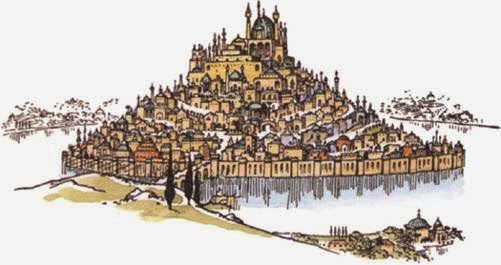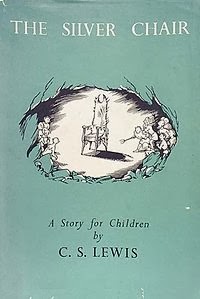“This is a story about something that happened long ago when your grandfather was a child.”
When Digory’s father is posted to India and his mother becomes ill, they must leave their country life and settle in London with Uncle Andrew and his sister, Aunt Letty. Fortunately Digory soon meets Polly, a girl who lives in one of the connecting row houses, and the adventure begins!
While trying to find a passage through the attics from Polly’s house to Digory’s, they inadvertently stumble into the workroom of Uncle Andrew. To this point, Digory has not had much contact with his scientific uncle, but this experience proves without a doubt his uncle’s evil nature. With a magic ring, he sends Polly into another world with no chance of returning, without Digory entering the world as well, with two magic rings that will bring them back.
 |
| Aslan in the process of creating Narnia’s animals Pauline Baynes 1955 |
Lewis believed that each one of our actions in life either took us one step closer to Heaven, or one step closer to Hell. Now, this didn’t mean that by doing something bad, you would go to Hell; Lewis wanted people to be aware that their actions matter. Our actions are what form our character and each action works either towards forming a good, trustworthy, amiable character, or a bad, prideful, self-centred character.
Uncle Andrew is a fine example of a character gone rotten. He is untrustworthy, lacks a conscience and is extraordinarily narcissistic, believing because of his perceived superior intellectual skills and his ability as a magician and scientist, that he is exempt from societal conventions and moral obligations. His cultivated vanity is uncontainable, and in his selfishly aggrandized mind, the ends always justify the means.
At the beginning of the story, while being different from his uncle, Digory, however, shows some disturbingly similar traits. He exhibits the same weakness as his uncle when, in The Wood Between Two Worlds, he suggests that instead of going directly back to the study, they explore another pool. Curiosity overcomes his common sense and a stubborn prideful attitude closes his ears to Polly’s initial prudent advice. Fortunately he agrees to Polly’s insistent demand to test the rings to see if they are able to return easily; unconstrained curiosity can get one into unexpected perils and it is important that a thirst for knowledge is tempered with a respect for the nature of things.
Similarly in Charn, even though Digory senses that it is a “queer place,” he once again ignores Polly’s suggestion to leave, using words to deride and mortify her to make her abandon common sense. Finally, he again allows his curiosity to override his good judgement, when he rings the bell in Charn, waking an evil that is beyond his imagination. Curiously, just before this act, Polly remarks, “You look exactly like your uncle when you say that.”
Yet finally Digory starts to make wise choices. In spite of being initially captivated by the evil Empress Jadis, his enchantment begins to dissipate after he hears of her ruthless destruction of Charn and of her plans to travel to their world. He also has the integrity to make a full confession when Aslan asks him about the evil that he brought into Narnia, and his bravery and honesty serve him well, as Aslan trusts him with the quest of bringing back a magic apple to grow a tree to protect Narnia from the evil that lurks there. Within the garden there is a replay of the temptation of Eve, this time with Jadis as the tempter and Digory the intended victim. Yet Digory shows surprising resilience, faithfully resisting the witch’s manipulations and temptations, returning to fulfil his quest. Through the characters of Uncle Andrew and Digory, we see the formation of a virtuous character who makes prudent choices (with mistakes along the way), and the result of a deceptive and corrupt character who makes the wrong choices .
 |
| The Mountains of Mourne …. inspired Lewis to write the Chronicles of Narnia … source Wikipedia |
Ah, this post is already too long but there are so many other elements enmeshed in this fascinating tale. Lewis’ use of “supposition” to represent the creation of Narnia was just lovely. There are obvious parallels to Genesis and the creation of Earth, but also differences, that are as creative as they are compelling. Aslan singing the entire world of Narnia into existence, evoking edenic and pastoral images, is a beautifully captivating scene. The Deplorable Word is thought to be a reference to the atomic bomb; when Lewis began writing this book, the world was at war, and its annihilation would certainly have been foremost in his mind. And there is also an example Plato’s theme of self-deception, which we see played out in the character of Uncle Andrew. Plato believed that self-deception was a state of mind where irrational desires supersede natural reason as a guide for ethical behaviour, and while the person believes that their conduct will bring them happiness, in effect, it only brings them misery. Socrates also levelled the charge against his countrymen that blindly pursuing knowledge through any means, with the goal being the resulting power attained, can only be realized at the expense of truth and morality.
The last book in the Chronicles of Narnia series is, of course, The Last Battle. I can’t wait!







.jpg)



.jpg)



















